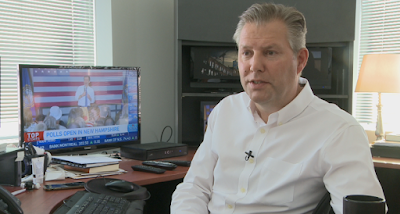While reporting on its own can require the ability to distinguish when to take a step back or ask for help, not every journalist can tell right away when a scene has affected them. The responsibility to moderate and keep tabs on the mental state of staff falls on the News Director.
We interviewed Jeff Little, News Director at CTV Calgary, about his experiences with hardship both personally in the field as a veteran reporter and what he has noticed watching over staff from a managerial perspective.
You need to leave town. You can be gone for days, you can be gone for weeks.
Little worked for three years as a national reporter as the correspondent for Alberta, South Saskatchewan and South-Eastern British Columbia before moving to the assignment desk at CTV Calgary. He says the biggest challenge was being away from his family.
"I had a young family, and when you're in a national posting, there are occasions where you need to hit the road. You need to leave town. You can be gone for days; you can be gone for weeks. So balancing work and life became a major challenge. I had two young kids and parenting was new to both of us at that point, so juggling the hours required to be a solid national reporter and a good parent was a major challenge."
Working in the field can require being on-call at difficult times to work around, which can strain personal relationships with friends, colleagues and family.
Anytime you're covering something of major consequence for peoples' lives, those stories stick with you.
Little's career spans just over 25 years in the industry, starting as a video-journalist. The role requires the reporter to shoot and edit as their own cameraman as they are on the scene conducting interviews and speaking on-camera themselves. The position itself was gone for a time as jobs became more specialized, but has since returned in the modern reporting world. It can leave reporters feeling isolated as they encounter difficult experiences, which is why Little says that on assignment, he doesn't send staff on their own to anything that could leave an impact. According to the DART Centre for Journalism and Trauma, one of the risk factors for PTSD in the field comes from a perceived lack of social support (Newman et al., 2003).
"Anytime you're covering something of major consequence for peoples' lives, those stories stick with you whether that's a kidnapping, a homicide, maybe it's soldiers being killed. Those stories that impact people to that degree are stories that stay with you. Stories where you're speaking to families of victims, you don't forget about those occasions. You don't forget about those people--the victims, I mean--and the people they've left behind. That stays with you forever."
Exposure to assignments of high intensity or trauma is another risk factor for PTSD (Backholm & Bjӧrkqvist, 2010; Dworznik, 2011; Feinstein et al., 2002; Pyevich et al., 2003; Smith et al, 2017). Little added, "When you talk to those people, those families, it leaves an imprint absolutely. It's something you don't forget, and I think it's what drives a lot of people who are in this business because you develop a different sort of capacity to process those emotions and those feelings; at the same time, you still have your compassion and empathy for those victims. To see what they go through and their willingness to share those stories... You know, that's incredible, it really is, and it does bring value and reinforces to you how important what you're doing really is."
Among the protective factors for PTSD is a strong sense of purpose as a journalist (Novak & Davidson, 2013).

Comments
Post a Comment